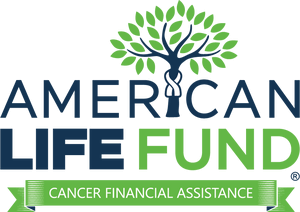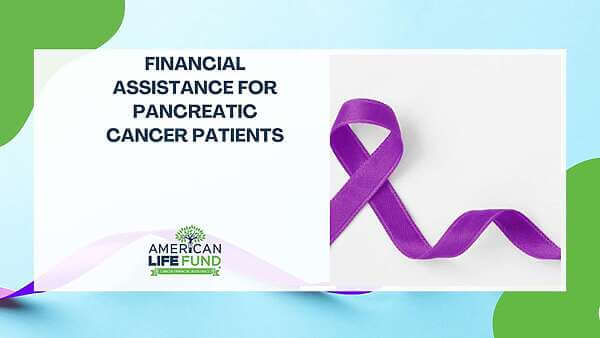Key Takeaways
- Pancreatic cancer treatment can be costly, but help is available.
- Viatical settlements provide immediate funds by selling life insurance policies.
- Grants from organizations like PanCAN and the Lustgarten Foundation assist with treatment costs.
- CancerCare and the American Cancer Society offer financial aid for medical and travel expenses.
- NeedyMeds helps reduce prescription costs.
- Fundraising can provide additional financial support.
Medical bills and treatment costs are the last thing you want to think about after receiving a cancer diagnosis. Despite all of the options available nowadays, substantial efforts are required to make sure you’re secure on that front. Thankfully, American Life Fund (ALF) has broken down the many resources available to help ease this burden.
By connecting with your healthcare team and partnering with ALF, you can find these resources and get the financial assistance you need to focus more on healing and less on financial worries. Asking for help is a strong step forward. With the right resources, you can lighten the load of medical expenses and concentrate on recovery.
What to Expect Financially as a Pancreatic Cancer Patient
The costs associated with treating pancreatic cancer are staggering to say the least. On average, the lifetime cost of pancreatic cancer treatment in the U.S. can reach up to $174,000.
Even with insurance, the financial strain on families can be significant, with out-of-pocket expenses ranging from $2,500 to $10,000 per month, depending on the treatment plan.
Major expenses include hospitalization and surgery (up to $25,000 per hospital stay), chemotherapy ($1,000 to $12,000 per month), and targeted therapies (up to $30,000 per month). In-home care and supportive services add to the financial burden.
While insurance covers a large portion of these expenses, around 20% of the costs can still fall on the patient and their family. This doesn’t account for indirect costs, such as lost income due to caregiving responsibilities.
How To Find Financial Assistance For Pancreatic Cancer Patients
Contacting Your Healthcare Team:
Your healthcare team is your initial resource. Reach out to your oncologist, social worker, or patient navigator, as they can connect you to local and national programs, understand your unique needs, and recommend suitable assistance programs.
Nonprofit Organizations:
Nonprofit organizations like Pancreatic Cancer Action Network (PanCAN) and CancerCare provide valuable patient support. They offer various assistance programs, including financial aid, information resources, and emotional support.
Pharmaceutical Assistance Programs:
Pharmaceutical companies frequently have programs to assist patients with the costs of prescription medications. Your healthcare provider can help you identify and apply for these programs.
Local Support Services:
Explore your area’s local organizations, community centers, and cancer support groups. These resources often provide financial aid, transportation services, and emotional support. Contact them or visit their offices to inquire about available programs.
Online Resources:
Several online databases and websites, like the Cancer Financial Assistance Coalition (CFAC), NeedyMeds, and Cancer.net, are dedicated to helping you find specific financial assistance programs.
Social Workers and Patient Navigators:
Social workers and patient navigators at hospitals and cancer treatment centers are experienced in assisting patients with financial support. They can provide valuable guidance and information on available resources.
Life Insurance Life Insurance and Financial Support Through Viatical Settlements
Life insurance provides necessary financial security for loved ones, but for individuals facing serious health challenges like pancreatic cancer, it can also offer immediate financial relief through a viatical settlement. This option allows you to receive a significant lump sum from your life insurance policy to help cover urgent needs, reducing financial stress when it matters most.
What is a Viatical Settlement?
A viatical settlement allows you to sell your life insurance policy to a third party for cash, typically at a value greater than the policy’s cash surrender amount but less than its face value. This one-time payout can be used to cover high medical costs, household bills, or other essential expenses, giving you more financial flexibility and peace of mind.
Benefits of a Viatical Settlement with American Life Fund
American Life Fund specializes in viatical settlements for those with severe medical conditions, including pancreatic cancer. By working with American Life Fund, you can benefit from a streamlined process, compassionate guidance, and an experienced team dedicated to helping you access the funds you need.
- Immediate Access to Cash: Turn your life insurance policy into cash to cover medical expenses, treatments, or other pressing financial needs.
- Simplified Process: American Life Fund offers a straightforward, supportive application process tailored to pancreatic cancer patients.
- Eligibility: Generally, policies of $200,000 or more are eligible. American Life Fund can guide you through eligibility specifics and answer any questions about your policy.
See if you qualify today and learn how American Life Fund can help turn your policy into financial relief by visiting here.
Pancreatic Cancer-Specific Financial Grants From Organizations
For individuals facing the financial challenges associated with being diagnosed with pancreatic cancer, some organizations specifically offer both financial aid and grants tailored to the unique needs of pancreatic cancer patients. These grants cover medical expenses, treatment, and other related financial burdens. Here are some noteworthy organizations that provide such support:
Pancreatic Cancer Action Network (PanCAN):
PanCAN offers financial support through its “Know Your Tumor” precision medicine service, which helps identify treatment options and clinical trials. Additionally, PanCAN provides Patient Central, a valuable resource for financial assistance information, support groups, and clinical trial matching.
Pan Foundation:
Pan Foundation grants provide a fast, reliable way to pay for out-of-pocket medication costs, health insurance premiums, and transportation expenses. They offer grants to help you with out-of-pocket medication copay costs, health insurance premiums, and transportation for activities that benefit your overall health.
The Lustgarten Foundation:
The Lustgarten Foundation provides financial assistance through research grants dedicated to finding a cure for pancreatic cancer. Although their primary focus is research, advancements in treatment and understanding the disease can indirectly alleviate financial burdens for patients and their families.
The Hirshberg Foundation for Pancreatic Cancer Research:
The Hirshberg Foundation funds research and offers support services, including financial aid for pancreatic cancer patients. They understand patient challenges and aim to alleviate some of the financial burdens. Their longstanding partnership with Cancer Care allows patients to apply for a one-time grant to help cover the costs related to cancer treatment.
Patient Advocacy Foundations:
Various patient advocacy foundations and local nonprofit organizations may also assist pancreatic cancer patients financially. These organizations often work to address the specific needs of individuals within their communities.
Project Purple
Project Purple is a non-profit organization dedicated to supporting patients, raising awareness, and educating the world about pancreatic cancer. They focus on improving patients’ lives through research for early detection and curative treatments, along with providing patient financial aid.
Accommodation During Pancreatic Cancer Treatment
Housing is a big concern for pancreatic cancer patients, especially when undergoing treatment, which may require lengthy hospital stays or frequent visits to medical facilities.
The financial burden of lodging and related living expenses adds stress to an already challenging situation. To address these concerns, several programs and resources are available to provide housing and financial assistance during pancreatic cancer treatment:
American Cancer Society’s Hope Lodge:
The American Cancer Society offers Hope Lodge facilities across the United States. These facilities provide free temporary lodging for cancer patients and their caregivers during treatment.
Joe’s House:
Joe’s House is an online directory that has information about lodging options near cancer treatment centers. It helps patients and their families find affordable and convenient places to stay.
Hospital-Based Lodging:
Many hospitals and cancer treatment centers offer on-site or nearby lodging options for patients and their families.
Prescription Assistance
Managing the cost of prescription medications, pain medication and prescribed treatments is one of the largest financial challenges for pancreatic cancer patients. Fortunately, there are programs and resources available to help with these expenses:
Prescription Assistance Programs (PAPs):
Pharmaceutical companies offer Prescription Assistance Programs to give free or low-cost medications to eligible patients. These programs are a valuable resource for accessing expensive cancer medications.
NeedyMeds:
NeedyMeds is a comprehensive resource that has information on prescription assistance programs, co-pay assistance, and free clinics. They also offer a medication discount card.
GoodRx:
GoodRx is an online platform that helps patients compare prescription drug prices and find discounts and coupons for their medications.
Does Stage 4 Pancreatic Cancer Qualify For Disability?
Yes, stage 4 pancreatic cancer is typically eligible for Social Security Disability Insurance (SSDI) due to its severity. Here’s a breakdown of requirements:
- Medical Criteria: The SSA defines disability as a condition expected to last at least 12 months or result in death, preventing substantial gainful activity (SGA). Stage 4 pancreatic cancer generally meets these criteria.
- Work Credits: SSDI eligibility also requires sufficient work credits, typically around 40, with 20 earned in the last 10 years. These credits are based on work history and Social Security tax contributions.
- Compassionate Allowances: As a severe condition, stage 4 pancreatic cancer qualifies under the SSA’s Compassionate Allowances, expediting the application process.
- Documentation: A complete application includes medical records, imaging, treatment history, and doctor’s notes. Consulting a legal or disability advocate can streamline the process.
While SSDI isn’t income-based, applicants with substantial resources or those currently earning above the SGA threshold may not qualify. Applications can be submitted online, by phone, or in person at an SSA office, but approval times vary based on individual circumstances and documentation provided.
Frequently Asked Questions
Is there a financial assistance program specifically for pancreatic cancer patients?
Yes, there are several financial assistance programs designed to help pancreatic cancer patients manage treatment costs. These programs provide financial aid for a variety of needs, from medication to everyday living expenses and transportation costs. Many organizations, such as the Pancreatic Cancer Action Network, also offer guidance on resources for patients in active treatment.
What types of expenses can financial support cover?
Financial support programs typically cover a range of needs, including transportation costs to and from treatment, help with everyday living expenses, and even specific medical costs not covered by insurance. Assistance can vary by program, so it’s a good idea to review the details of each one to see what’s included.
How can American Life Fund help with providing financial aid?
American Life Fund specializes in viatical settlements, a unique way of providing financial support for those with fighting cancer. By turning your life insurance policy into immediate cash, you can gain financial aid to cover medical expenses, daily needs, and other urgent costs, allowing you to focus on recovery.
What is the best way to apply for financial aid?
To apply for financial aid, first reach out to your healthcare team, who can connect you to relevant programs. You can also explore resources provided by nonprofits, pharmaceutical companies, and organizations like American Life Fund, which offer customized financial assistance programs for those in need.






